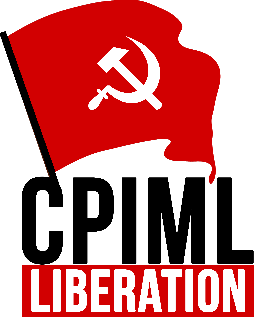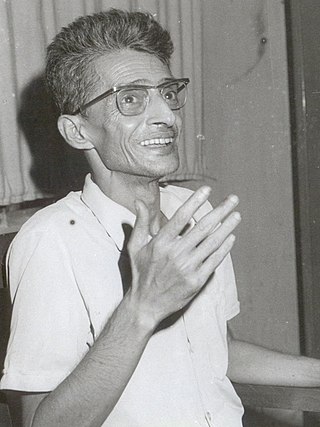Related Research Articles

The Communist Party of India (Marxist) (abbreviated as CPI(M)) is a communist political party in India. It is the largest communist party in India in terms of membership and electoral seats, and one of the national parties of India. The party was founded through a splitting from the Communist Party of India in 1964 and it quickly became the dominant faction.

The Communist Party of India (Marxist–Leninist) (CPI (ML)) was an Indian communist party formed by the All India Coordination Committee of Communist Revolutionaries (AICCCR) at a congress in Calcutta in 1969. The foundation of the party was declared by Kanu Sanyal at a mass meeting in Calcutta on 22 April, Vladimir Lenin's birthday. Later the CPI(ML) party splintered into several Naxalite groups.

Communist Party of India (Marxist–Leninist) Janashakti, abbreviated CPI (ML) Janashakti, was a communist political party in India. In 2013, CPI (ML) Jansakthi merged into CPIML.

The Communist Party of India (Marxist–Leninist) Liberation is a communist political party in India. The party is represented in Bihar and Jharkhand Legislative Assemblies. Since 2023, the party is also a member of the INDIA electoral alliance. In Bihar, party has significant base amongst the Extremely Backward Castes and the Schedule Castes. It was successful in mobilising Upper Backward Caste group such as Koeris in some districts of central Bihar, prior to the rise of Lalu Prasad Yadav. The party faced existential crisis when a large section of its Koeri and Yadav support base was defected to Rashtriya Janata Dal in 1990s. However, the ideological commitment of its cadre protected it from disintegration. It staged a comeback in politics after winning twelve seats in Bihar Legislative Assembly in 2020 and by sending two of its members to Lok Sabha in 2024 Indian general elections.

Communist Party of India (Marxist-Leninist) is an anti-revisionist Marxist–Leninist communist party in India. After the death of Charu Majumdar in 1972 the Communist Party of India (Marxist-Leninist) pro Charu Majumdar central committee was led by Mahadev Mukherjee and Jagjit Singh Sohal, and the Central Committee took a stand to defend the line of Charu Majumdar on 5–6 December 1972.

The Provisional Central Committee, Communist Party of India (Marxist–Leninist) was a communist political party in India. The general secretary of the party was Santosh Rana. The party is often referred to as CPI(ML) [Santosh Rana Group] or likewise.

Charu Mazumdar, popularly known as CM, was an Indian Communist leader, and founder and General Secretary of the Communist Party of India (Marxist-Leninist). Born into a progressive landlord family in Siliguri in 1918, he became a Communist during the Indian Independence Movement, and later formed the militant Naxalite cause. During this period, he authored the historic accounts of the 1967 Naxalbari uprising. His writings, particularly the Historic Eight Documents, have become part of the ideology of a number of Communism-aligned political parties in India.
The Central Reorganisation Committee, Communist Party of India (Marxist–Leninist) was a communist group in India 1979–1991. The Secretary of the All-India Leading Committee of the CRC, CPI(ML) was K. Venu. The main organ of CRC, CPI(ML) was called Mass Line. CRC, CPI(ML) also published Liberation and Comrade.
Kanu Sanyal was an Indian communist politician. In 1967, he was one of the main leaders of the Naxalbari uprising and in 1969 he was one of the founding leaders of Communist Party of India (Marxist-Leninist). Sanyal died by suicide on 23 March 2010.
Mamidi Appalasuri was an Indian communist leader. Appalasuri was one of the leaders of the tribal uprising in Srikakulam. When the Andhra Pradesh Committee of Communist Revolutionaries was expelled from the All India Coordination Committee of Communist Revolutionaries in 1968, Appalasuri remained with the AICCCR led by Charu Majumdar. In 1969 Appalasuri was one of four Central Committee members of the new Communist Party of India (Marxist-Leninist) from Andhra Pradesh.

Vempatapu Satyanarayana (Satyam) was a schoolteacher, member of several Indian Communist organizations, and a leader of the Srikakulam peasant uprising of 1967, along with Adibhatla Kailasam and Subbarao Panigrahi. They had started the "land to tiller" movement in Andhra Pradesh, which later spread to South Odisha.
Vinod Mishra was an Indian communist politician. Mishra served as the General Secretary of the Communist Party of India (Marxist-Leninist) Liberation between 1975 and 1998.
The Central Organising Committee, Communist Party of India (Marxist–Leninist) Party Unity, more commonly known as CPI(ML) Party Unity or simply 'Party Unity', was a communist party in India 1982-1998. Narayan Sanyal alias Naveen Prasad was the general secretary of the party. Party Unity was the official organ of the party. CPI(ML) Party Unity was one of the predecessors of the Communist Party of India (Maoist).
Satyanarayan Singh was an Indian communist politician. Singh was one of the early leaders of the Communist Party of India (Marxist-Leninist), being its secretary in Bihar.
Sushital Ray Chowdhary was an Indian Communist intellectual and founder member of Communist Party of India (Marxist-Leninist). He was the editor of the organs of the CPI, CPI(M) and CPI(ML). He eventually fell out with the mainstream Charu Majumdar group and died of a heart attack in March, 1971.

Saroj Dutta popularly known comrade SD, was an Indian communist intellectual and poet, active in the Naxalite movement in West Bengal in the 1960s. He was the first West Bengal state secretary of Communist Party of India (Marxist-Leninist). He also remained editor-in-chief of the Amrita Bazar Patrika during the 1940s.

The Communist Party of India Red Star was formed in 2009 merging with various factions of CPI (ML), following the Bhopal Special Conference in 2009. with K N Ramachandran as the General Secretary, who has been reelected to the post in the 9th, 10th and 11th Congresses of the Party, which were held in 2011 at Bhubaneswar (Odisha) in 2015 at Lucknow & 2018 at Bengaluru (Karnataka) 5respectively.

Lal Sena was an organised armed militia of CPIML Liberation in northeastern India, across the terrains of central Bihar, north-west of today's Jharkhand, and a few districts of eastern Uttar Pradesh. It was formed mainly by lower caste peasantry and landless labourers.

Naxalbari uprising was an armed peasant revolt in 1967 in the Naxalbari block of Siliguri subdivision in Darjeeling district, West Bengal, India. It was mainly led by tribals and the radical communist leaders of Bengal and further developed into the Communist Party of India (Marxist–Leninist) in 1969. The armed struggle became an inspiration to the Naxalite movement which rapidly spread from West Bengal to other states of India creating division within the Communist Party of India (Marxist) - India's primary communist party.
Central Organising Committee, Communist Party of India (Marxist–Leninist) was a communist party in India, one of the main splinter factions of the original Communist Party of India (Marxist–Leninist). COC, CPI(ML) occupied a middle position between the pro-Charu Majumdar group led by Mahadev Mukherjee and the anti-Majumdar group led by Satyanarayan Singh. Failing to articulate a common ideological position, COC, CPI(ML) soon suffered internal divisions and splits. Two of the splinter groups of COC, CPI(ML) in Andhra Pradesh are predecessors of the present-day Communist Party of India (Maoist).
References
- 1 2 3 4 5 6 7 8 9 10 11 12 13 14 15 Liberation. Obituary
- ↑ The Anvil. Naxalbari and Subsequent Four Decades: A Retrospection
- ↑ Sumanta Banerjee (1984). India's Simmering Revolution: The Naxalite Uprising. Zed Books. p. 155. ISBN 978-0-86232-037-9.
- ↑ Trade Union Record. All-India Trade Union Congress. 1981. p. 54.
- ↑ Liberation. Nimai Ghose. 2001. p. 32.